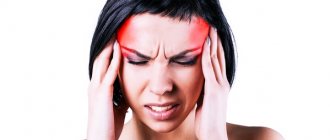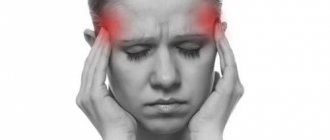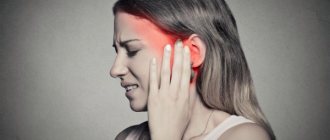Against the background of anxiety and nervous stress, in addition to worsening emotional stress, a person often experiences side effects. Often one of these phenomena is the appearance of itching on the skin. This problem often accompanies depression, nervous breakdowns and anxiety. To quickly deal with the “enemy”, it is necessary to analyze the development mechanism, as well as the cause of the problem. Next, we’ll look at why your head itches due to nerves, methods of dealing with the problem, and also give effective preventive methods that will help you avoid getting into a similar situation in the future.
Main types of scalp
- Normal, with the sebaceous glands producing only the required amount of sebum to maintain softness and elasticity.
- Dry, with scanty presence of this fat and insufficient supply of nutritional components. The skin dries out and the head itches.
- Flaky dandruff with the appearance of dandruff, scalp burning, discomfort, the patient complains of itching regardless of the type, hormonal imbalance appears.
- Oily, characterized by excess sebum production, tangled and greasy hair.
- The deeper ones produce new cells to replace the dead ones on the surface of the epidermis.
- They exfoliate and are removed from the top layer, gradually renewing the scalp.
- Here are hair follicles, sebaceous and sweat glands, sebum, nerve endings, and cells responsible for immune defense.
- They provide metabolic functions, tactile sensations, and regulate skin temperature.
The structure of the skin includes several layers:
Any failure in these functions can lead to disruption of processes and the appearance of problems when the scalp itches.
Mechanism of itching
Itching often occurs in people who have poor control over their emotional state and are prone to nervousness. The main representatives of this group are women and children who have problems in controlling experiences and emotions.
The prerequisites for the problem to appear are: lack of sleep, conflict at work, nervous tension, depression, and so on. In the process of mental stress, the level of production of the hormone of the adrenal cortex, which has increased anti-inflammatory properties, decreases. This causes the skin to itch.
Scalp problems
The most common complaints include itching, dandruff, dryness and flaking. The causes of these symptoms can be different:
- unfavorable influences of the external environment;
- sun activity;
- chlorinated water;
- blow drying;
- frequent showers;
- incorrectly selected shampoo;
- varnishes, masks and other hair care products;
- low humidity levels;
- allergy;
- hormonal imbalance;
- genetic predisposition.
Also, dryness and itching, flaking of the skin can cause atopic dermatitis and other skin diseases.
Psychogenic nature of burning and itching
The term “psychosomatics” is quite common these days. It is defined as the occurrence of bodily manifestations based on psychological factors.
If during the examination of the patient it is not possible to find objective reasons causing such impressions, the matter is most likely in the mental sphere of the person. Or rather, in its negative manifestations.
For example, itching and burning sensations in the body develop against the background of a stressful situation . If it was a one-time problem, then after it is eliminated, the unpleasant manifestations also disappear.
As for chronic stress , these symptoms may persist or even intensify. This, in turn, increases nervous tension and aggravates the situation. It turns out to be a vicious circle.
There is an understandable explanation for the appearance of skin paresthesias in psychological disorders. With negative emotions, the body increases the production of serotonin and dopamine. It is these neurotransmitters that provoke the occurrence of itching and burning, usually without visible skin elements. But sometimes a rash, dryness and peeling may appear.
Types of skin itching
The condition when the back of the head or the entire skin itches is a protective reaction to remove the irritating factor. There are different types of itching:
- Dermatological, characteristic of atopic dermatitis, scabies, lice, psoriasis.
- Neurological, arising from lesions of the nervous system.
- Systemic, observed in various pathologies of internal organs.
- Psychogenic, appearing under stress and psycho-emotional tension.
- Multifactorial, in the case of simultaneously different causes of origin.
- Idiopathic, with an unclear etiology.
- Other.
Burning sensation and its origin
A burning sensation in the body and limbs manifests itself in the form of tingling, a sensation of heat. It is constantly present throughout the day or has a wave-like character, but, as a rule, does not bother you at night.
The appearance of this symptom is facilitated by damage to the peripheral nerves. This is observed, for example, in diabetes mellitus . In this case, the burning sensation is concentrated primarily in the extremities, followed by tingling and numbness.
Sciatica is an inflammation of the sciatic nerve, accompanied by a burning sensation in the legs up to the foot.
With multiple sclerosis, the burning sensation is combined with tingling. Such an alliance extends to the limbs. One should be wary of their simultaneous occurrence with problems of speech and coordination.
Radiculopathy is damage to the nerve roots of the spinal nerves. In this case, a pathological feeling of heat also occurs in the arms and legs.
Dangerous is the appearance of a burning sensation in one half of the body. Along with other signs, such as unclear speech, headache, blurred vision, delirium, hallucinations, it can be a sign of a stroke .
Heat in the legs often indicates vascular pathology .
Other conditions that can cause this sensation include:
- spider and snake bites;
- poisoning by chemical compounds;
- avitaminosis;
- calcium deficiency;
- burns.
Particular discomfort is caused by itching and burning in a woman’s intimate area (vagina, vulva and perineum).
A burning sensation in the vagina, along with dryness, are manifestations
of menopausal changes or atrophic inflammation . If the cause of the burning sensation is various kinds of discharge, then this indicates candidiasis, inflammatory processes or sexually transmitted diseases .
Moderate itching in the vaginal area may indicate an allergic reaction to latex or medications. The discussed symptoms in the vulva (external genitalia) also appear against the background of sexually transmitted infections . Other reasons may be:
- lice;
- eczema and mycoses;
- tumor-like formations;
- helminthic infestations;
- kidney and liver diseases.
The perineum includes the area around the genitals and anus. The occurrence of unpleasant sensations in it indicates the presence of such conditions :
- helminthic infestations;
- allergy to powder or linen;
- haemorrhoids;
- rectal tumors;
- systemic diseases;
- sexual infections;
- herpes, candida;
- incorrect hygienic approach.
What to do if you're dry
Choose milder herbal shampoos enriched with plant oils and extracts. They will help restore lost balance and remove increased sensitivity, redness and irritation.
Use argan and olive oil, which contains unsaturated fatty acids and vitamin E (tocopherol), which transform hair into elastic, elastic and silky. They contain linoleic, oleic, palmitic, stearic, vanillic acid, as well as fungicides, tyrosol, and sterols. This composition moisturizes the scalp and strengthens brittle hair.
Take a not too hot shower, wash with slightly warm water. Higher temperatures help remove fat, causing irritation.
Prevention
To reduce the risk of itching for psychological reasons, you need to limit yourself from stressful situations. Additionally, you should review your diet and increase your fruit intake. An important point is adherence to sleep and rest patterns - their lack can cause itching.
You can also experiment with medicated herbal shampoos that have a healing effect and strengthen the scalp, which are available at the pharmacy.
The problem under consideration is quite unpleasant, but still amenable to simple treatment, provided timely attention is paid to it. Nowadays it is impossible to live without stress - everyone is under threat, which is why the risk of itching due to nervousness is quite high, especially if a person has reduced resistance to stress.
It is necessary to remain calm, eat right, do exercises, get enough sleep, and rest. This helps reduce the risk of itching, as well as its negative side effects such as redness of the skin and even hair loss due to scratching, which can further worsen a person’s emotional state. If a problem arises, you should contact your doctor as soon as possible.
Pathologies that cause acute itching of the scalp
- Dandruff can be large in oily skin and small in dry skin. It appears as a result of stress, poor nutrition, hormonal imbalance, and the influence of a warm and humid climate.
- Seborrheic eczema is characterized by not only itching, but also rashes, redness and inflammation of the skin, often leading to the appearance of blisters. The rash can also affect the neck and face.
- Fungal infections are difficult to treat and cause itching, redness, blisters, and peeling. Over time, fungal spores penetrate deeper layers and cause severe infection and intoxication. They easily infect other people and are transmitted through contact and household contact.
- Seborrheic dermatitis is characterized by inflammation and affects areas rich in sebaceous glands. It is caused by fungi of the genus Malassezia, the same as dandruff, and is characterized by flaking and varying degrees of damage to the skin and hair.
- Infestation with lice, fleas, ticks and other parasites turns hair into a breeding ground for disease. They become covered with nits, which are difficult to comb out even with a special comb. In this case, total treatment with anti-pediculosis drugs, which are sold in pharmacies in the form of sprays and solutions, is required.
- Allergic reactions can occur even to hair care and styling products that have been used for more than one year. The cause of the allergy can be found out with a test from a dermatologist.
- Chemical and mechanical irritation with acute itching is also caused by hair dye, wearing tight headwear, and the use of care products with aggressive components included in the composition.
- Psoriasis manifests itself as small flaking of the scalp, redness, formation of plaques and thick scabs. It forms both single spots and affects large damaged areas. The patient feels tightness of the skin, itching, and it begins to peel off severely.
Itching of the scalp Constant burning of the scalp, tingling, desire to scratch - painful itching. Why does it arise? The reasons may be the following: an allergic reaction or the development of a dermatological or trichological disease.
Diagnostics
As with most things related to health changes, it is not a good idea to self-diagnose the problem and try to determine the cause. Instead, you should consult a doctor who, based on the information provided by the patient, will render a verdict and determine what was the catalyst for the problem. The main factor indicating that the cause of the itching was an emotional component is the appearance of the symptom:
- at the same time as stress;
- soon after the patient suffered stress;
- during prolonged depression.
Note! The itching is mostly local and episodic. The disease can manifest itself in various parts of the human body, for example, on the head, arms, legs, etc. They begin to itch especially severely at night. The condition is also often accompanied by redness and rashes.
Other mental and nervous disorders
It is worth noting that these unpleasant sensations in the intimate area also appear with other types of neurosis.
Here is a case described in psychotherapeutic practice. A young woman aged 22 went to a psychiatric hospital. Because of this, their sexual and marital life is destroyed, the couple is on the verge of divorce.
During the survey, it was found that the girl got married at the insistence of relatives at the age of 19. And her husband is 18 years older than her. She developed normally, and at the time of coming to the center she was physically healthy, including gynecologically.
Conclusion: hysterical psychopathy , a symptom of hysterical genitalgia. This symptom developed due to the girl’s negative attitude towards her husband and sex life in general. Pain and burning in the vagina in this case act as an unconscious pathological adaptation mechanism for avoiding sexual intimacy with the husband. The symptom was eliminated with the help of hypnosis, but the dislike of sexual relations remained.
Thus, in this situation, a burning sensation in the intimate area became a manifestation of exclusively mental disorders, despite physical health.
Vegetative-vascular dystonia can also be accompanied by sensations of heat and itching in the body. The reason for this is an imbalance in the functioning of the nervous system. This disorder leads to changes in cardiac activity, which is why the condition is often accompanied by a burning sensation in the chest. It is accompanied by other symptoms such as arrhythmia, shortness of breath, heart pain, pressure surges, dizziness and loss of consciousness.
Itchy and “hot” sensations in neuroses
Neurosis is a psychogenic nervous disorder associated with emotional, behavioral and somatovegetative disorders. What distinguishes it from other mental illnesses is that the patient is fully aware of the severity of his condition and strives to get rid of it.
A distinction is made between mental and physical neurosis. Physical neurosis, along with psychogenic disorders, also has physical symptoms. There are several varieties of it.
Skin neurosis is manifested by burning and itching of the skin against the background of its bluish, marbled tint. The skin of the joints and legs becomes rough and tightens.
This condition is characterized by changes in sensitivity. It can be reduced or, conversely, increased when unpleasant sensations appear at the slightest touch. With physical neurosis, the skin itches and “burns” in certain areas or throughout the body, becomes wet or dry. Tactile hallucinations are characteristic.
The patient is so bothered by these manifestations that he scratches his body until it bleeds, leaving wounds and abrasions.
The reasons for this condition are:
- mental and physical stress;
- stress;
- conflict situations;
- brain injuries;
- hormonal disorders;
- infections.
Muscular neurosis . This condition is preceded by physical overexertion, as well as prolonged monotonous activity.
The disease is accompanied by a burning sensation throughout the body or in certain areas against a background of muscle tension and spasms. Another characteristic symptom is pain in the chest, neck and face.
Neurosis of the genital organs . The main manifestations of this syndrome are itching and burning in the genital area, which occur after sexual intercourse, during the menstrual period and for a number of other reasons.
The culprits of the disease are:
- mental infantility;
- chronic fatigue;
- conflicts in the family.
What can itching and feeling of heat in the body lead to?
These symptoms are so uncomfortable that it is simply impossible to ignore them. All attention is concentrated on them, which is why a person becomes inattentive, absent-minded, disruptions appear in his professional activities, and his performance decreases.
Irritability and tension reach a peak state. Depression and nervous breakdowns are possible. Such overexertion leads to mental imbalance. The patient's sleep is disturbed and insomnia develops. As a result, during the day he feels exhausted and sleep-deprived.
Severe itching in the intimate area sometimes leads sufferers to the point that they use various objects that injure the mucous membrane and skin in this area.
Scratches on the skin and mucous membranes can become infected, inflamed and suppurate, spreading the process to larger areas.










